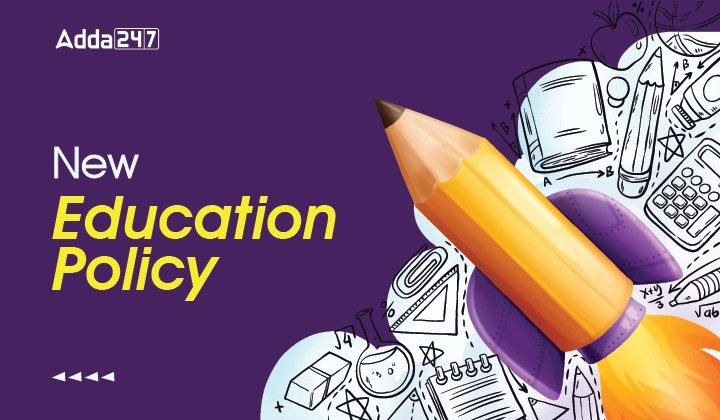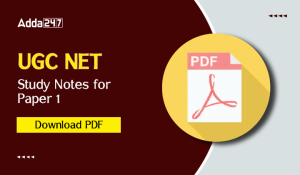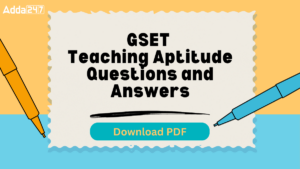Table of Contents
Child Development and Pedagogy (CDP) is a crucial part of TET and other teaching recruitment exams. Teaching Aptitude is also significant for some exams, including UGC NET, CTET, HTET, KVS making focused preparation essential. CDP features in all levels of teaching exams—primary, upper primary, and higher education. With numerous teaching exams approaching, aspirants must strengthen their understanding of this section. Today’s spotlight is on the New Education Policy (NEP)—a frequently asked topic in teaching exams. This study note on NEP will enhance your preparation and boost your confidence in tackling this key subject area.
New Education Policy नई शिक्षा नीति
The National Education Policy was framed in the year 1986, with a modification made to it in the year 1992. With such a long period of time between 1992 and 2020, the education sector has undergone a lot of change. Moreover, with the change in the society, economy and other sectors, education needs to change according to the needs of the people and the current situation of the country.
राष्ट्रीय शिक्षा नीति को वर्ष 1986 में निर्मित किया गया था, जिसे वर्ष 1992 में संशोधित किया गया था। 1992 और 2020 के बीच इतनी लंबी अवधि के साथ, शिक्षा क्षेत्र में बहुत बदलाव आया है। इसके अलावा, समाज, अर्थव्यवस्था और अन्य क्षेत्रों में परिवर्तन के साथ, शिक्षा लोगों की जरूरतों और देश की वर्तमान स्थिति के अनुसार बदलने की जरूरत है.
The Government of India has already initiated the process of framing a New Education Policy. It has taken an inclusive holistic and participatory approach this time, which will take into consideration lots of research (both empirical and theoretical), expert opinions, field experiences and much more.
भारत सरकार ने नई शिक्षा नीति तैयार करने की प्रक्रिया शुरू कर दी है। इस बार इसमें एक समग्र और सहभागी दृष्टिकोण लिया गया है, जो बहुत सारे अनुसंधान (अनुभवजन्य और सैद्धांतिक दोनों), विशेषज्ञ की राय, क्षेत्र के अनुभव और बहुत कुछ को ध्यान में रखेगा।
In this regard, the Draft National Education Policy was prepared by a committee in the year 2019. The committee was chaired by Dr K. Kasturirangan. The policy, which was shared by the Ministry of Human Resources and Development, aims to make India a knowledge superpower. It will do so by giving students the necessary knowledge and skills. Additionally, the policy intends to eliminate the shortage of manpower in Science and Technology, academics as well as other industries. It is built on the foundational pillars of Equity, Access, Quality, Accountability and Affordability.
इस संबंध में, मसौदा राष्ट्रीय शिक्षा नीति वर्ष 2019 में एक समिति द्वारा तैयार की गई थी। समिति की अध्यक्षता डॉ के कस्तूरीरंगन ने की थी। मानव संसाधन और विकास मंत्रालय द्वारा साझा की गई नीति का उद्देश्य भारत को ज्ञान महाशक्ति बनाना है। यह छात्रों को आवश्यक ज्ञान और कौशल देकर ऐसा करेगा। इसके अतिरिक्त, नीति का उद्देश्य विज्ञान और प्रौद्योगिकी, शिक्षाविदों और अन्य उद्योगों में जनशक्ति की कमी को दूर करना है। यह निष्पक्षता, पहुँच, गुणवाता, जवाबदेही और सामर्थ्य के संस्थापक स्तंभों पर बनाया गया है.
FEATURES OF THE NEW EDUCATION POLICY: नई शिक्षा नीति की विशेषताएं:
The salient features of the Draft National Education Policy are मसौदा राष्ट्रीय शिक्षा नीति की मुख्य विशेषताएं हैं:
- This New Education Policy will cover school education, higher education as well as professional education. This will, in turn, also include legal, agricultural, technical and medical education as well. यह नई शिक्षा नीति स्कूल शिक्षा, उच्च शिक्षा के साथ-साथ व्यावसायिक शिक्षा को भी कवर करेगी। यह बदले में, कानूनी, कृषि, तकनीकी और चिकित्सा शिक्षा को भी शामिल करेगा
- The policy will also take into consideration the verticals of vocational education. It will do so by including research and innovation, along with teacher education. नीति व्यावसायिक शिक्षा के कार्यक्षेत्र को भी ध्यान में रखेगी। यह शिक्षक शिक्षा के साथ-साथ अनुसंधान और नवाचार को शामिल करके करेगा।
- The Ministry of Education will also likely integrate within itself early child care and education. शिक्षा मंत्रालय भी संभवतया प्रारंभिक बाल देखभाल और शिक्षा के भीतर एकीकृत होगा
- The New Education Policy will also focus on specific foundational skills which children should have. In regards to this, the ministry has proposed a new structure of 5+3+3+4, wherein the first stage of five years will be for children aged between 3 to 8 years. The next stage is the Preparatory Stage for children with 8 to 11 years of age or Std. 3 to 5, followed by the Middle Stage for children in 6 to 8 and age groups of 11 to 14 years. The final stage will be the Secondary Stage, for students aged between 14 to 18 years and are in Std. 9 to 12. नई शिक्षा नीति उन विशिष्ट मूलभूत कौशलों पर भी ध्यान केंद्रित करेगी जो बच्चों के पास होने चाहिए। इस संबंध में, मंत्रालय ने 5 + 3 + 3 + 4 की एक नई संरचना का प्रस्ताव दिया है, जिसमें पांच साल का पहला चरण 3 से 8 वर्ष की आयु के बच्चों के लिए होगा। अगला चरण 8 से 11 वर्ष की आयु के बच्चों या कक्षा 3 से 5 के बच्चों के लिए प्रारंभिक चरण है, इसके बाद मध्य चरण में कक्षा 6 से 8 के बच्चों और 11 से 14 वर्ष की आयु के बच्चों के लिए स्टेज है। अंतिम चरण 14 से 18 वर्ष की आयु के छात्रों के लिए माध्यमिक चरण होगा, और यह 9 से 12 कक्षा तक होगा।
- The Policy also suggests governance level changes for school education. It suggests a State Regulatory Authority to regulate education in the country. This authority will also be responsible for accrediting different schools. नीति में स्कूली शिक्षा के लिए शासन स्तर के बदलाव का भी सुझाव दिया गया है। यह देश में शिक्षा को विनियमित करने के लिए एक राज्य नियामक प्राधिकरण का सुझाव देता है। यह प्राधिकरण विभिन्न स्कूलों को मान्यता देने के लिए भी जिम्मेदार होगा
- According to the policy, the higher education system will be restructured into Tier 1, Tier 2 and Tier 3. Tier 1 will include research universities that focus equally on teaching and research. Tier 2 will include teaching universities with a primary focus on teaching, while Tier 3 will include colleges that focus only on teaching at undergraduate levels. Furthermore, all these institutions will gradually become fully autonomic, at the academic, administrative as well as financial level. नीति के अनुसार, उच्च शिक्षा प्रणाली को टियर 1, टियर 2 और टियर 3 में पुनर्गठित किया जाएगा। टीयर 1 में शोध विश्वविद्यालयों को शामिल किया जाएगा जो शिक्षण और अनुसंधान पर समान रूप से ध्यान केंद्रित करते हैं। टीयर 2 में शिक्षण पर प्राथमिक ध्यान देने के साथ शिक्षण विश्वविद्यालय शामिल होंगे, जबकि टीयर 3 में ऐसे कॉलेज शामिल होंगे जो केवल स्नातक स्तर पर शिक्षण पर ध्यान केंद्रित करते हैं। इसके अलावा, ये सभी संस्थान शैक्षणिक, प्रशासनिक और वित्तीय स्तर पर धीरे-धीरे पूरी तरह से स्वायत्त हो जाएंगे
- The policy has also suggested the National Scholarship Fund, which would give students financial support for their higher education. नीति ने राष्ट्रीय छात्रवृत्ति कोष का भी सुझाव दिया है, जो छात्रों को उनकी उच्च शिक्षा के लिए वित्तीय सहायता देगा।
- The New Education Policy also promotes classical and regional languages and their study. नई शिक्षा नीति शास्त्रीय और क्षेत्रीय भाषाओं और उनके अध्ययन को भी बढ़ावा देती है
- It also further proposes to increase the class of compulsory education till Std. 12. यह 12 वीं कक्षा तक अनिवार्य शिक्षा की श्रेणी को बढ़ाने का भी प्रस्ताव करता है
- One of the main aims of the Draft National Education Policy or the new Education Policy is the achievement of a fully literate society where every single adult is literate by the year 2030. मसौदा राष्ट्रीय शिक्षा नीति या नई शिक्षा नीति के मुख्य उद्देश्यों में से एक पूरी तरह से साक्षर समाज की उपलब्धि है जहां हर एक वयस्क वर्ष 2030 तक साक्षर है
The New Education Policy, or the Draft National Education Policy, definitely has a lot of specific details along with clarity. However, it still needs a few changes in order to be implemented in a better manner. If successful, the policy will bring about a paradigm shift in the field of education in India. It will not only empower young minds with better skills and enhanced knowledge but will also help teachers as well as educational institutions in the country.
नई शिक्षा नीति या मसौदा राष्ट्रीय शिक्षा नीति में निश्चित रूप से स्पष्टता के साथ कई विशिष्ट विवरण हैं। हालाँकि, इसे बेहतर तरीके से लागू करने के लिए अभी भी कुछ बदलावों की आवश्यकता है। यदि यह सफल रहा, तो यह नीति भारत में शिक्षा के क्षेत्र में प्रतिमान बदलाव लाएगी। यह न केवल बेहतर कौशल और उन्नत ज्ञान के साथ युवा दिमाग को सशक्त करेगा, बल्कि शिक्षकों के साथ-साथ देश में शैक्षणिक संस्थानों को भी मदद करेगा.
Download NEP Study Notes PDF
The direct link to download New Education Policy- nEP Study Notes PDF has been provided below. Check the link for more details.
Download New Education policy Notes PDF




 UGC NET Study Notes for Paper 1, Downloa...
UGC NET Study Notes for Paper 1, Downloa...
 GSET Teaching Aptitude Questions and Ans...
GSET Teaching Aptitude Questions and Ans...
 समुद्र का पर्य�...
समुद्र का पर्य�...












